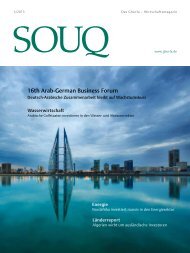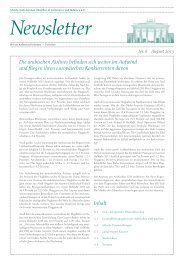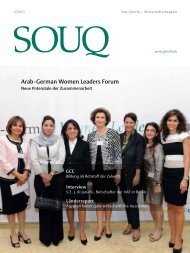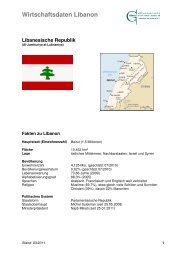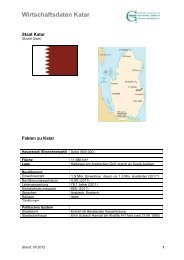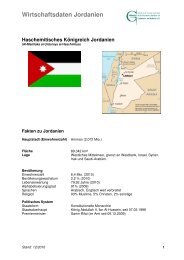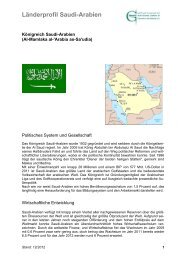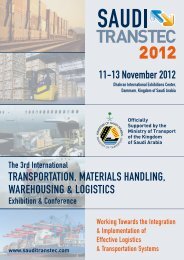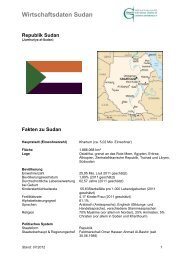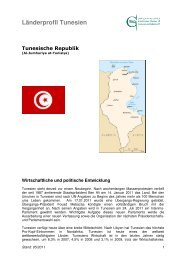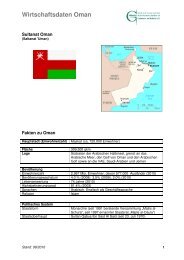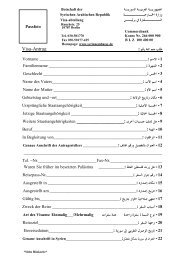Saudi-Arabien Wirtschaftshandbuch Saudi Arabia Business ... - Ghorfa
Saudi-Arabien Wirtschaftshandbuch Saudi Arabia Business ... - Ghorfa
Saudi-Arabien Wirtschaftshandbuch Saudi Arabia Business ... - Ghorfa
Erfolgreiche ePaper selbst erstellen
Machen Sie aus Ihren PDF Publikationen ein blätterbares Flipbook mit unserer einzigartigen Google optimierten e-Paper Software.
138<br />
and women and trainers in sports clubs; foreign workers<br />
that work on specific projects in <strong>Saudi</strong> <strong>Arabia</strong> for up to a<br />
period of two months.<br />
the employment contract<br />
The employment contract should be drawn up in<br />
writing. It is subject to the <strong>Saudi</strong> labour law and must<br />
be written in Arabic. Agreements in other languages are<br />
also equally valid. The agreement must state exactly the<br />
object of the work, i.e. the position, and also the salary<br />
and leave entitlement. Furthermore, the agreement may<br />
stipulate a probationary period, however this may not<br />
exceed 90 days. During this period, the agreement can<br />
be terminated by both parties at any time. Also, if the<br />
employee becomes party to any special inside knowhow<br />
about the company, the agreement may contain a<br />
non-competitive clause, however this may not exceed<br />
a period of two years after the end of the working<br />
relationship (Art. 83 Labour Law).<br />
In the case of qualified foreign workers, the “job package”<br />
usually also comprises the following components:<br />
– a basic wage;<br />
– rent for accommodation in a so-called compound,<br />
i.e. in a residential unit that complies with western<br />
standards of living;<br />
– school money for the children;<br />
– at least one flight home every year;<br />
– the provision of a car.<br />
Also, there are laws stipulating that the employer needs to<br />
assume the costs for visas and work permits, the so-called<br />
Exit-and Re-Entry-Visa costs, and also the costs for the<br />
flight from the home country to <strong>Saudi</strong> <strong>Arabia</strong> to start<br />
work and the return flight home at the end of the employment<br />
period.<br />
Employment contracts with foreign nationals usually<br />
have a defined term, which can be extended. On the one<br />
hand this depends on the needs of the employer and his<br />
wish not to enter into a long-term working relationship<br />
too soon, but to have a certain amount of planning security<br />
for a defined period, and on the other, the restrictions<br />
of the work permit play a role. For this reason, Art. 37<br />
of the new labour law also stipulates that employment<br />
contracts with foreign nationals should be defined for a<br />
specific period. If this is not expressly regulated, it is automatically<br />
assumed that the employment relationship is<br />
restricted to the term of the work permit. In the case of<br />
domestic workers, non-restricted contracts are common.<br />
The leave entitlement should comprise at least 21 days;<br />
the leave entitlement for employment relationships that<br />
exceed 5 years is at least 30 days.<br />
termination of a working relationship<br />
Employment contracts are terminated by means of<br />
– mutual annulment;<br />
– the expiry of a limited employment contract that is<br />
not extended;<br />
– one-side termination of an unlimited contract;<br />
– when the statutory retirement age is reached;<br />
for women this is at the age of 55 and for men,<br />
60, although employment contracts can be<br />
extended beyond this age.<br />
In the case of unlimited employment contracts, a period of<br />
notice of 30 days must be observed, if the worker is paid<br />
on a monthly basis. In the case of workers who are paid at<br />
shorter intervals, the period of notice is 15 days.<br />
The contractual notice of dismissal requires a so-called<br />
valid reason. If the reason is not valid, the employee can<br />
demand that he remains employed.<br />
The extraordinary notice of dismissal requires serious dismissal<br />
reasons that are specifically listed in Art. 80 of the<br />
<strong>Saudi</strong> Labour law. These include breaches of contract such<br />
as e.g. important contractual conditions. Notwithstanding,<br />
the regulation is designed as a general clause and the<br />
dismissal reasons need to be analysed in each separate case<br />
as to whether or not this actually justifies an extraordinary<br />
dismissal. This is particularly important for limited<br />
employment contracts as these cannot be terminated with<br />
one month’s notice.<br />
the pension / end of service award<br />
An important issue in <strong>Saudi</strong> labour law, as in other states<br />
in the region, is the so-called end of service award. It is also<br />
called severance pay and often ‘compensation’ although<br />
this term is not quite accurate. Rather it is the pension<br />
paid by the employer. The employer has a duty in <strong>Saudi</strong><br />
<strong>Arabia</strong> to form future pension reserves for each employee<br />
as the employer does not pay into a pension fund for the<br />
employee. The end of service award paid at the end of the<br />
employment relationship is still mandatory. It is calculated<br />
as follows: a half salary for each of the first five years<br />
of employment and a full month’s salary for each further<br />
year (Art. 84 of the Labour law). In case the employee<br />
terminates an unlimited employment contract, the sum is



